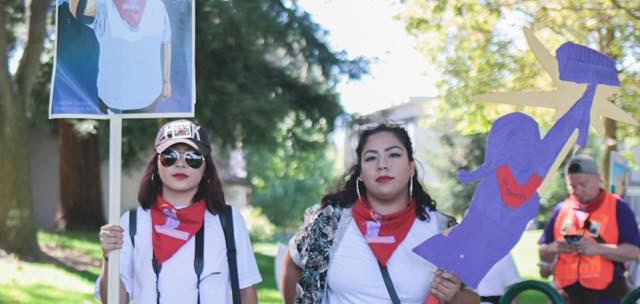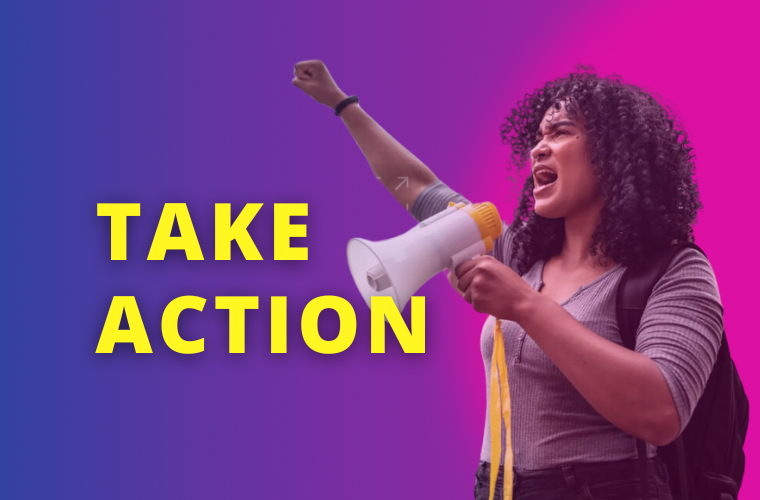

Our Bodies on the Line: Latina Equal Pay and #MeToo
This piece was originally published by Luz Collective, and cross-posted here with permission.
Nearly one year ago exactly, we experienced a watershed moment in the anti-sexual violence movement that many movement leaders had not expected to see in our lifetimes. By chance, the timing of this moment coincided with the national observation of Latina Equal Pay Day, bringing together two issues that gravely impact many Latina workers.
To some, the two issues may seem unrelated. But to the female farmworker who is promised higher pay for complying with sexual demands by her boss, to the janitor whose hours are cut for rejecting the sexual advances of a manager, to the factory worker who is laid off for not tolerating explicit sexual jokes and touching by her crew foreman, and to the domestic worker who is not covered by federal protections against sexual harassment and is vulnerable to be being cheated out of wages with no recourse because she works in a private home, the connection is obvious.
Supervisors, managers and other people with authority commonly threaten the economic security of those who they are trying to yield power over for their own personal pleasure.
Workers and organizers have long understood this relationship. Supervisors, managers and other people with authority commonly threaten the economic security of those who they are trying to yield power over for their own personal pleasure. This includes threatening workers’ ability to get or keep a job. If protections are available, workers often do not know their rights, or are afraid to exercise those rights for fear of risking their jobs or facing some other kind of retaliation.
The line between sexual harassment and economic security is thin. And it is a line that many low-paid women workers, especially immigrant workers, have been made to feel they must walk in order to keep their jobs.
But low-paid women workers have been organizing and rising together for years to end the workplace sexual violence and unfair pay practices. Over the past year of increased activism, Latinas have led historic protests across the country, organizing in their workplaces and communities for fair working conditions and better treatment. Women of all ages are putting their bodies on the line, not just for each other, but for every woman worker.
In April, 150 women employed as farmworkers and domestic workers convened on Capitol Hill to educate lawmakers about how both groups of workers have been harmed by the failure to extend rights afforded to most other workers under the Fair Labor Standards Act, and about the fact that existing federal anti-discrimination laws do not protect all workers, including those working for employers with fewer than 15 employees.
On Sept. 10, 100 female janitorial workers walked 100 miles, marching from San Francisco to Sacramento, to protest rampant rape on the night shift. They marched for 5 days to support a California bill that would’ve mandated peer-to-peer training for janitors, so they could teach those new to the profession how to be safe and how to enforce their rights if necessary.
Four days later, on Sept. 18, thousands of McDonald’s workers in cities across the U.S. walked out during the lunchtime rush to protest rampant workplace sexual harassment and demand that the world’s second largest employer do more to address the issue. It was the first multi-state strike over sexual harassment in more than 100 years.
And, today, Latinas will once again lead a day of political and civic action to demand more. This year, we mark Latina Equal Pay Day on Nov. 1, meaning the average Latina in the U.S. had to work an extra 10 months into 2018 (22 months) just to catch up with the average non-Hispanic white man’s 2017 earnings. At 53 cents per $1.00, Latina women, on average, have the biggest wage gap in our country.
As Latina organizers have shown us, economic exploitation and sexual harassment stem from the same fundamental devaluation of women workers — especially women workers of color.
As we mark Latina Equal Pay Day, we are deeply grateful to Latina workers and movement leaders who are exposing these connections and reframing our fight for fair pay and safe working conditions in the #MeToo era.
Today, we will have a conversation about how the sexual harassment relates to pay discrimination and why we will vote for political leaders who are committed to ending both.
Today, if someone asks you what equal pay has to do with sexual harassment, you know the answer: Everything.
Mónica Ramírez is the founder of Justice for Migrant Women, co-founder of Alianza Nacional de Campesinas, and she leads the National Latina Equal Pay campaign on behalf of the Equal Pay Today! Coalition. Follower her on Twitter and Instagram @monicaramirezDC
Noreen Farrell is the Executive Director of Equal Rights Advocates and Chair of the Equal Pay Today! Campaign. Follow her on Twitter @farrellERA
Stay Connected & Take Action
- Get the Latest News & Information Sign up for Email Updates
- Sign Up for Action Alerts Join the Action Team
- Follow Us


